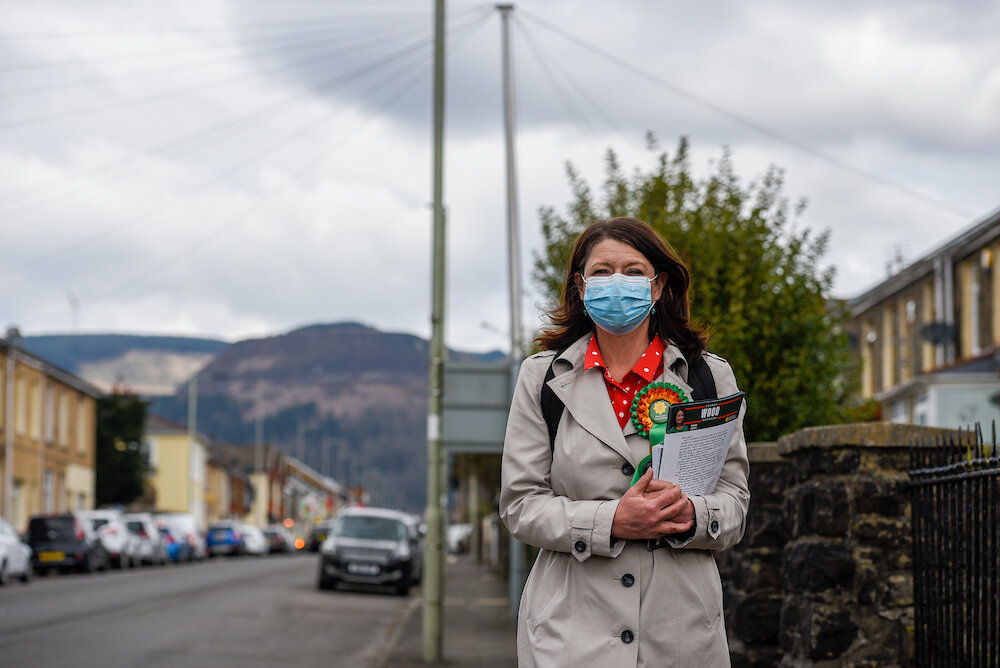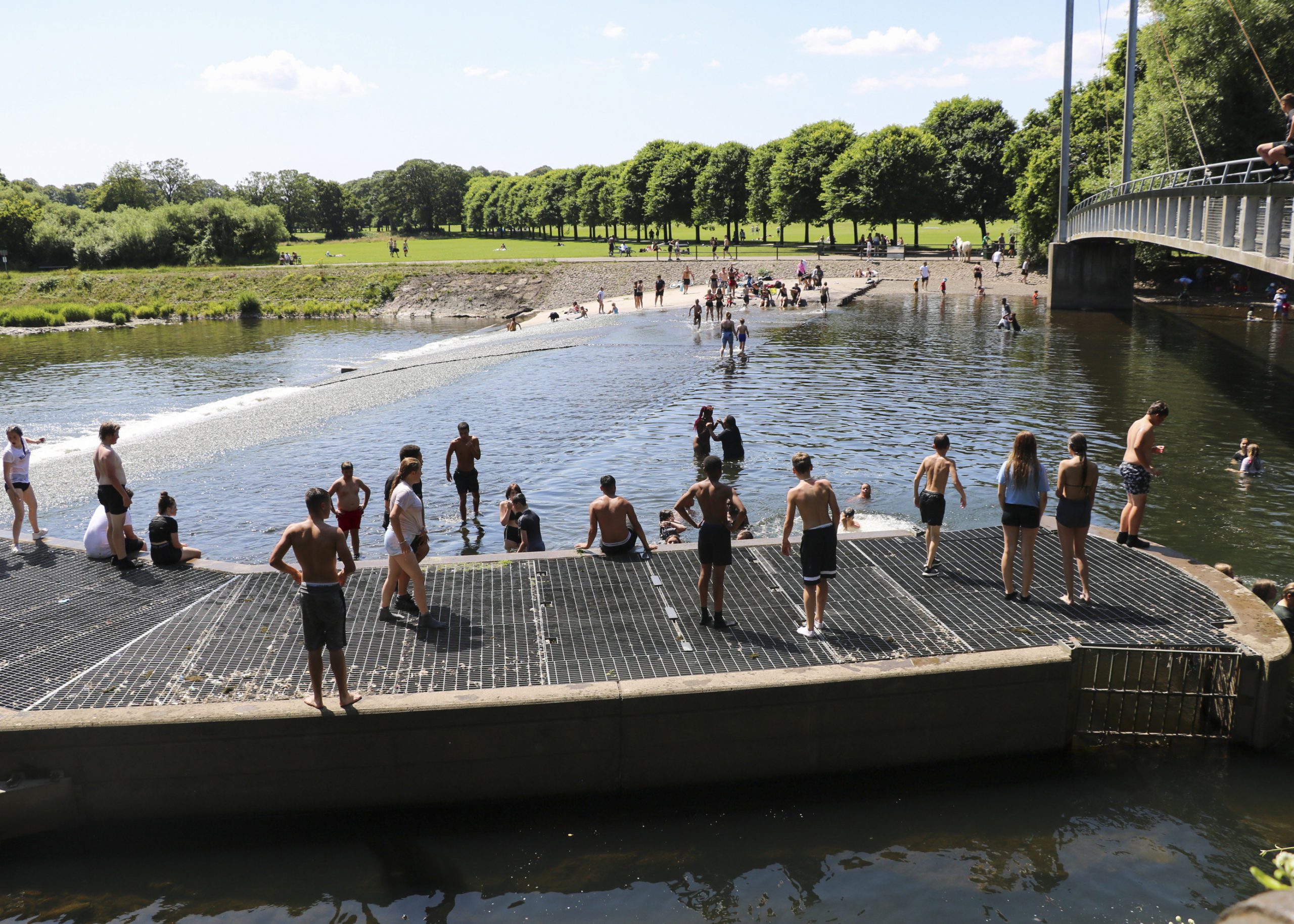
Plaid Cymru’s Leanne Wood Pays Heavy Price for Lacklustre National Campaign
Leanne Wood campaigning in Treherbet. Photo, Andrew Dowling
CAMPAIGN PUT THE ISSUE OF INDEPENDENCE TO ONE SIDE, AND INSTEAD FOCUSSED ON A SERIES OF PLEDGES WHICH FAILED TO MOBILISE VOTERS IN KEY RHONDDA SEAT.
SC Cook
Leanne Wood, former leader of Plaid Cymru and one of Wales’ most prominent left wing figures, has lost her seat to Labour in The Rhondda, after a hard fought campaign conducted in the throes of a pandemic which has hit the area particularly hard.
Despite strong organisation on the ground, and a high profile across the whole constituency, Wood failed to overcome a rejuvenated Welsh Labour, who capitalised on the public’s goodwill over their handling of the pandemic and Mark Drakeford’s confrontations with Boris Johnson.
But the prominent socialist also struggled to mobilise voters against the backdrop of a lacklustre national campaign which failed to put the question of Welsh independence front and centre.
A former probation officer and PCS union activist, Leanne Wood became a member of the Welsh Parliament in 2003, and remained active in the anti-war movement after taking office and stayed committed to fighting for union members throughout.
She came to prominence as the leader of Plaid Cymru in the 2015 UK general election, where she stood on an anti-austerity platform. In the Senedd elections in 2016, she caused a major political upset by defeating Labour in The Rhondda, showing that the party could be beaten from the left in its so-called heartlands.
She lost the party leadership to Adam Price in 2018, and remained an MS until this election. Wood was deeply connected to The Rhondda, when floods devastated communities in January last year, she worked throughout with a team of volunteers to help. When Covid hit soon after, she helped organise mutual aid networks.
A rare politician who isn’t afraid to step out of the Senedd bubble and get involved in grassroots activism, her defeat is a loss to anti-austerity campaigners.
One conciliation for the left of the party was the election of Heledd Fychan via the regional ballot in South Wales Central, and Plaid did benefit in a small way from the collapse of the far right, but overall they failed to make the gains they were hoping for, adding just one seat to their total and losing Wood’s crucial Valleys constituency in the process.
There’s no doubt that the party faced a difficult task heading into the election, and have sought to blame the result on the Covid effect. Speaking to ITV yesterday, the Plaid MS Elin Jones said that the election had been “difficult for Plaid because of Covid,” because Welsh Labour have been leading on the Covid response. Plaid Cymru, she said, had been “squeezed in the middle.” The inability to properly campaign will also have had an effect, but people are searching for other answers as well.
The Plaid Cymru MP Hywel Williams was asked by one presenter if the independence message “was the right one to go down?”
But any attempt to say that this election was a rejection of independence is misguided, because in reality it was never on the ballot. In fact a notable but ignored aspect of this election has been the surprising absence of Welsh independence as an idea.
Instead of trying to set the terms of the contest around independence, and attempt to make The Senedd elections a de-facto ‘referendum on Westminster rule,’ Plaid Cymru chose to focus on a series of policy pledges to that would have been enacted within the context of Wales remaining in the union.
The idea of devolution – a key pillar of 21st Century British unionism – was enforced rather than challenged.
The Plaid campaign leadership would likely contest this, and cite the fact that independence was high on the agenda of their manifesto, and that they had pledged to hold a referendum on the question within 5 years of getting into power.
But this would ignore the political reality on the ground, and is not born out by an analysis of their campaign.
In neither of the televised leaders’ debates – one of the biggest opportunities to introduce yourself to voters – did Adam Price try to put the issues of independence front and centre, and seek to set the terms of the discussion around breaking free of Westminster.
In the final debate before the vote, it took Price until the very end, when a question was asked by an audience member, for him to discuss the topic.
In the whole preceding 48 minutes, including in his opening remarks, Price didn’t raise the idea of independence once.
When he finally did discuss it, he did make some decent broadside attacks on the Tories, bringing in big themes around democracy and wealth ownership. The problem was, it was the only time he raised those topics. In his closing remarks, he chose again not to mention the idea of independence.
In Plaid Cymru’s election broadcast, seen by viewers on the BBC and online, independence was not mentioned in the parties list of key pledges, and viewers had to wait until the very end for the idea of ‘an independent nation’ to be offered in passing.
A look at the party’s Twitter feed told a similar story, with graphics focussing on its key pledges, none of which featured independence.
In a 2 minute video of Adam Price posted the day before the election, independence wasn’t mentioned at all. The party’s material posted through letter boxes didn’t put the idea front and centre and try to win the case for independence.
Price did discuss the issue at length in a Wales Online interview, in response to several questions from the outlet on the topic, but the party rarely seemed willing to raise it without prompt. Taken in the round, the impression is that the party leadership took a deliberate decision not to make the question of breaking away from the union the central theme of their campaign.
The party instead ran on the vague slogan ‘vote for Wales’ and chose a raft of policies that looked relatively similar to other mainstream parties, albeit more radical in many areas.
Welsh Labour on the other hand were determined to run on their handling of the pandemic and the leadership of Mark Drakeford, something they knew they had support on.
Despite Wales having one of the highest death rates in the world, this was successful, and largely framed the discussion throughout the election. It forced the Tories to attack them over lockdown, playing into Labour’s hands and highlighting the occasions when Drakeford had taken a different path to Johnson over Covid.
Plaid were caught in the middle. The party was unwilling to properly criticise Welsh Government’s handling of Covid and their policy pledges failed to cut through. At the same time, they allowed unionist parties to define independence in more negative terms, or paint it as a distraction.
In areas like Llanelli or The Rhondda, the approach wasn’t enough to motivate people in the numbers required. Wood fell from a 50% to a 30% vote share, losing over 4,000 ballots in the process. In contrast, Labour climbed 19 points.
Independence – the idea of a radical break from Tory rule – could have provided the party with a stronger organising idea, and pulled the focus away from Drakeford and Welsh Labour.
It could also have allowed the party to talk about poverty, exploitation, housing and so on in much bolder terms. As it was, the idea was often set to one side.

This is all the more surprising given the growing appetite for independence, which polled as high as 29% leading up to the election, only around five points behind Welsh Labour.
The Opinium poll for Sky News also found that a majority of 18 – 34 year olds – 53% – backed the idea.
Pro indy campaign group Yes Cymru has piled on over 15,000 paying members since the start of the pandemic, and Covid has given rise to the idea of divergence from Westminster.
Had Plaid tried to mobilise that support in the election, they could have found themselves in a different position whilst at the same time giving an unprecedented platform to the issue itself.
Politically, it could also have given the party some welcome distance between themselves and Welsh Labour, who they were seen as relatively close to coming into the election. Both parties backed a second EU referendum and Plaid became less critical of Mark Drakeford as the pandemic wore on.
But with the question of Brexit settled, the party had an opportunity to raise a different constitutional question, one that would have allowed it to discuss big ideas around democracy, power, wealth distribution and self determination.
Rival parties would have been forced to unite against Plaid, casting them as the outsider and insurgent political force.
Attempting to frame the election around the question of independence, rather than Covid, could have given space for the party to push a series of arguments against Westminster, and for a rupture with the status quo.
As we saw in the general election of 2017, when a credible platform is put forward, one that isn’t afraid to challenge the failure of neoliberalism head on, it can mobilise young people and those who are often turned off by politics.
Such a strategy isn’t without risks, but standing on a platform of electoral platitudes hasn’t worked, and has lost the party one of its most popular and cherished figures, as well as setting them back in the key battle area in Welsh elections: the Valleys.
Plaid Cymru, with its traditional marriage of landowners, business and working class voters, is clearly not best placed to put forward a radical vision of independence into an election, but it could have made loud noises in this direction.
Criticisms it has faced over a failure to oppose transphobia and the stances of some of their police and crime commissioner candidates can also be seen as part of a wider malaise that puts the party’s radical credentials into doubt.
When Wood won the Rhondda in 2016, she did so by doubling the Plaid vote in comparison to 2011, beating the establishment Welsh Labour candidate.
At the time she talked about her campaign giving people ‘hope,’ but it was also that she had defined herself against austerity as Plaid Cymru leader, and stood against the pro-cuts position of Labour leader Ed Miliband in the 2015 election.
She set the terms of debate, won the argument and mobilised people. Even though, taken individually, some of Plaid’s pledges were to the left, the campaign didn’t take the fight to an unfair system.
In the final leaders debate, Price finally got onto this territory, when he talked about “corruption” and “royalties going to Westminster,” but this wasn’t the language which dominated the election. Independence, posed as a referendum on 40 years of neoliberalism in Wales, could have been an exciting prospect.
As it was, the party’s message got drowned out by Welsh Labour.
Coming out of this election, it would be foolish for either independence supporters or unionists to think that the issue of secession from Westminster is settled.
The huge electoral diversion between Wales, England and Scotland will only increase the tension between the UK Government and the nations within its orbit.
The question is, who is best placed to exploit the crisis.


